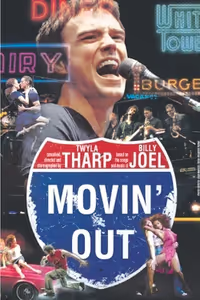Company Previews Thread
#475Company Previews Thread
Posted: 11/17/21 at 9:05pm
"Conte certainly has the voice to sing it..."
Sorry, that's really not a closed case, at least not from the NPR video, which one has to assume was approved by the creatives. The strain to straddle his own range is apparent. It wouldn't matter for any other song in the show, but like, maybe, "The Miller's Son," this number is defined by the vocal pyrotechnics, that effortless reach that literally sounds like a skyscraper. I remember first hearing Myers, and thinking "Well, damn that's just New York." I don't hear anything comparable here. And sorry, but this is the first male performance of the song on Broadway, not stock, not a regional. The song's function in the show requires it to be musically exhilarating. If it is on stage, I'll eat this words. I don't hear it in the voice, or the shaky vibrato that defines the performance.
#476Company Previews Thread
Posted: 11/17/21 at 9:06pm
Thanks, Taffy. I bought a second row seat for $59...I can't complain if I miss an entrance or two.
#477Company Previews Thread
Posted: 11/17/21 at 9:46pm
I really didn’t notice anything off by the way Bobby Conte sings the song. It sounds like you just may not like his voice in general, which is fine if that’s your opinion. The key he sings the song in isn’t even that high for a male voice. To be honest, my biggest gripe is the new rewrite that uses the word “message” twice in a row.
I’d love to hear Katrina Lenk sing all of her songs down a couple of steps. She has such a beautiful rich tone in her lower register; I bet people wouldn’t be complaining as much if she didn’t have to end the songs in her mix register. I’m all for Bobbie being an alto and I’d love to normalize singers who don’t screlt. This has nothing to do with Katrina’s voice and all to do with the keys she’s singing the songs in.
#478Company Previews Thread
Posted: 11/18/21 at 12:09am
I was at the third preview tonight, and it will be my last time for a little bit. The show is getting tighter but still ran around 2:50. I think it's just going to end up being a long show.
Audience was extremely enthusiastic and receptive tonight, more so than last night. You could really feel that the crowd was having an enjoyable time.
The cast keeps getting stronger, and this was probably the best Lenk has sounded out of all three performances. Her acting continues to really impress me. I love how she portrays Bobbie as living in a bad dream. It gets worse and worse until she makes her decision at the end, and she is finally relieved of the anxiety induced by her overbearing friends.
I noticed this during 2020, but Patti never gives the same performance twice, it's amazing how she changes things up from night to night. She is really doing some fine work on that stage.
I also need to note how utterly perfect Claybourne Elder is as Andy. His is another performance that seems to just get better with each show. I think he could be a major Tony contender with this role. He and Lenk are such a perfect pair, and I love every interaction they have together.
I've said it in 2020, and will say it again, the orchestra for this revival is absolute perfection. David Cullen's fresh orchestrations are the finest this score has ever had since the iconic 1970 orchestrations. His work blows away the 1995/1996 Tunick reductions.
I can't wait to see the shape this production is in by opening night. It's such a special evening of theater.
ellbellthomps
Leading Actor Joined: 11/15/17
#479Company Previews Thread
Posted: 11/18/21 at 8:19am
Super excited to see this.
For those who don't like Lenk or Conte, do you like them in other things? Wondering if it's simply actor preference.
For one, I love Lenk and I think about her performance in the bands visit daily, so I don't think I will be bothered by her in this.
#480Company Previews Thread
Posted: 11/18/21 at 9:22am
I appreciate the further analysis. A friend I trust went last night and said Conte "knocked it out of the park," so perhaps my biases are indeed about the timbre of the voice, not the singer's gift/ability. It's not the first time my response to a particular quality ended up a misreading of technique or vocal ability. In my defense (!), "Another Hundred People" is one of the few Sondheim songs that inspires that level of expectation. Again, I trace it back to Pamela Myers, whose first take remains so thrilling it laid down a gold standard.
But to your bigger point, shifting the song to a male voice should allow some room for a new sound entirely. It's possible that a -- what, Adam Lambert? -- might be unduly showy, not serving the character. I'm probably not entirely sure that I've made the adjustment to the male disposition imposed on the character. It's certainly possible for the sensibilities in the original Marta to be transposed; but I probably bring gender bias to my reservations about these cascading observations erupting in a dude.
I will see the show next month and decide. For what it's worth: I saw the original B'way production, if late (Jane Russell iteration, the great Marian Hailey as Amy) and have seen ever subsequent one, plus the national company when Julie Wilson played Joanne. I don't come to any Company chat without experience -- and again, biases.
#481Company Previews Thread
Posted: 11/18/21 at 9:29am
ellbellthomps said: "Super excited to see this.
For those who don't like Lenk or Conte, do you like them in other things? Wondering if it's simply actor preference.
For one, I love Lenk and I think about her performance in the bands visit daily, so I don't think I will be bothered by her in this."
I never got to see her The Band’s Visit but I did see her in Indecent and I think I’m just not much of a fan. She can be very intriguing and has compelling energy, but for me she comes across as very cold/lacking vulnerability as an actor. I think that can work beautifully for certain roles, but for me it’s just the opposite of what Bobbie needs—especially with such a huge internal emotional shift for the character.
JasonC3
Broadway Legend Joined: 4/22/21
#482Company Previews Thread
Posted: 11/18/21 at 10:07am
I remember a lot of people thinking Esparza was quite cold/icy as Bobby, as well as the entire Doyle production for some).
#483Company Previews Thread
Posted: 11/18/21 at 10:14am
JasonC3 said: "I remember a lot of people thinking Esparza was quite cold/icy as Bobby, as well as the entire Doyle production for some)."
That’s actually shocking to me. His portrayal was full of life and visceral. He felt like a volcano ready explode most of the show and was incredibly vulnerable. The emotional shift at the end was like an eruption. I guess it set the standard for me for how deep and big the emotions in this show can go.
bwwLA86
Chorus Member Joined: 3/10/20
#484Company Previews Thread
Posted: 11/18/21 at 10:29am
Thrilled to read so many positive notices. Seeing this around Christmas (23rd).
#485Company Previews Thread
Posted: 11/18/21 at 10:33am
Tomorrow night cannot get here fast enough.
JasonC3
Broadway Legend Joined: 4/22/21
#486Company Previews Thread
Posted: 11/18/21 at 10:33am
BroadwayGirl107 said: "JasonC3 said: "I remember a lot of people thinking Esparza was quite cold/icy as Bobby, as well as the entire Doyle production for some)."
That’s actually shocking to me. His portrayal was full of life and visceral. He felt like a volcano ready explode most of the show and was incredibly vulnerable. The emotional shift at the end was like an eruption. I guess it set the standard for me for how deep and big the emotions in this show can go."
I agree and I think the iciness was intentional, something alluded to in the NYT review:
"But if Bobby the bachelor, embodied with riveting understatement by Raúl Esparza, at first comes across as a man of ice, it becomes apparent that he is in a steady state of thaw. Given the subliminal intensity that hums through Mr. Esparza’s deadpan presence, you sense that flood warnings should probably be posted."
#487Company Previews Thread
Posted: 11/18/21 at 10:39am
Doyle isn’t exactly a director of “warm” productions, and I do think his Company was cold, generally, due to the austere look of the production (I mean, the cast sat on clear blocks that looked like ice cubes) and Doyle’s largely no-contact, representative staging.
I was also not a fan of Conte’s performance in that Little Desk concert, but I kind of thought that whole thing came off as a little stilted and weird.
#488Company Previews Thread
Posted: 11/18/21 at 10:43am
JasonC3 said: "BroadwayGirl107 said: "JasonC3 said: "I remember a lot of people thinking Esparza was quite cold/icy as Bobby, as well as the entire Doyle production for some)."
That’s actually shocking to me. His portrayal was full of life and visceral. He felt like a volcano ready explode most of the show and was incredibly vulnerable. The emotional shift at the end was like an eruption. I guess it set the standard for me for how deep and big the emotions in this show can go."
I agree and I think the iciness was intentional, something alluded to in the NYT review:
"But if Bobby the bachelor, embodied with riveting understatement by Raúl Esparza, at first comes across as a man of ice, it becomes apparent that he is in a steady state of thaw. Given the subliminal intensity that hums through Mr. Esparza’s deadpan presence, you sense that flood warnings should probably be posted.""
Right, but I think this is very different from the coldness I get from Lenk. One never got the feeling that an actor as explosively emotional as Esparza was not keeping the lid on big feelings. My complain about Lenk is that her capacity for that feeling—or at least to go there as an artists in front of an audience—seems limited. Esparza’s shift felt like his entire world and identity came crumbling down and he needed to start anew; to me Lenk’s emotions never felt bigger than a breakup from a very brief relationship with someone she was lukewarm about to begin with.
#489Company Previews Thread
Posted: 11/18/21 at 10:57am
Kad said: "Doyle isn’t exactly a director of “warm” productions, and I do think his Company was cold, generally, due to the austere look of the production (I mean, the cast sat on clear blocks that looked like ice cubes)and Doyle’s largely no-contact, representative staging.
I was also not a fan of Conte’s performance in that Little Desk concert, but I kind of thought that whole thing came off as a little stilted and weird.
"
I think Doyle’s production was very intentionally “icy” to created a slow build to a huge climax. That’s very different than just…not going there emotionally altogether.
#490Company Previews Thread
Posted: 11/18/21 at 4:06pm
Auggie27 said: "I appreciate the further analysis. A friend I trust went last night and said Conte "knocked it out of the park," so perhaps my biases are indeed about the timbre of the voice, not the singer's gift/ability. It's not the first time my response to a particular quality ended up a misreading of technique or vocal ability. In my defense (!), "Another Hundred People" is one of the few Sondheim songs that inspires that level of expectation. Again, I trace it back to Pamela Myers, whose first take remains so thrilling it laid down a gold standard.
But to your bigger point, shifting the song to a male voice should allow some room for a new sound entirely. It's possible that a -- what, Adam Lambert? -- might be unduly showy, not serving the character. I'm probably not entirely sure that I've made the adjustment to the male disposition imposed on the character. It's certainly possible for the sensibilities in the original Marta to be transposed; but I probably bring gender bias to my reservations about these cascading observations erupting in a dude.
I will see the show next month and decide. For what it's worth: I saw the original B'way production, if late (Jane Russell iteration, the great Marian Hailey as Amy) and have seen ever subsequent one, plus the national company when Julie Wilson played Joanne. I don't come to any Company chat without experience -- and again, biases."
I absolutely agree with you that Pamela Myers set the gold standard that no one has ever reached. It is a superior track that I go back to time and again.
I think part of the problem lies in the fact that it was written with a female belter in mind. A majority of the melody sits in Pamela Myers’s money-note range, which makes it entirely thrilling, especially when the orchestra opens up in that back half of the song. It doesn’t quite work the same in Bobby Conte’s (or many other men’s) voice in that way.
SouthernCakes
Broadway Legend Joined: 7/29/19
#491Company Previews Thread
Posted: 11/18/21 at 10:03pm
I love Lenk and thinks she conveys a very cool hip Downtown vibe, and I don’t need her to belt anything. I wish they had given her a music director who could mold the songs around her voice more. Right now she just seems uncomfortable and given how pitch perfect the rest of it is, I guess it sticks out. But I liked her acting and think she has a ton of charm.
StylishCynic
Stand-by Joined: 7/5/16
#492Company Previews Thread
Posted: 11/18/21 at 10:41pm
Any standing ovations during the show for any of the performances following the first preview this week?
#493Company Previews Thread
Posted: 11/19/21 at 12:49am
I haven’t seen this production yet as I’ll be seeing it in a few weeks with my mom… I had tickets to this, WSS, and How I Learned to Drive on a trip in spring 2020 of the before times… we all know how that turned out but this was by far the show I was most looking forward to the most, out of every new show. So I can’t wait to finally see it.
But regarding the whole Bobby Conte /Another Hundred people thing… I think hearing fierce belters perform this song in cabaret settings/ for Senior Showcase in college, etc., people have come to expect this song to be sung a certain way— that’s always disappointing when they see it performed in the actual show. I’ve never seen the song performed in a production of COMPANY the way I’ve heard it in a concert setting outside the actual show. I notice I’m always expecting “more” and get disappointed when I don’t get what I think* I want.
When I heard the London recording, this was the song I was most disappointed in. So when it came to NYC I expected a Jeremy Jordan/Aaron Tveit type of vocal (if you imaging how they’d sing the song)…… but then hearing Bobby sing it… I didn’t hate it and noticed I was listening to it differently than if sang how I “expected”. I listened to him sing the lyrics, what he was saying, and even though it wasn’t AT ALL what I was expecting…. It made me listen deeper than I would have if I was orgasming over his notes/runs/belt. So I really enjoyed it while also aware that he wasn’t doing his best or how he’d do it in the context of the actual show…
and c’mon you can’t tell me (if you watched it) that you didn’t get teary eyed when he sang “some go Away” and looked up above. He was clearly signing that line to Nick Cordero who was a friend of his and costar on A Bronx Tale…
jiaxing_26
Understudy Joined: 2/17/20
#494Company Previews Thread
Posted: 11/19/21 at 12:57am
Going to see it around early-/mid-January. What are the chances that it appears on TDF/TKTS? (I would say low but wonder how everyone thinks). Still deciding if I should buy full-price tix or rush on the day or TDF/TKTS.
#495Company Previews Thread
Posted: 11/19/21 at 1:59pm
I’m curious how others think about this. I think Company works best now as a period piece. So much of the script and the sound of the songs are very much of its time. I’m currently in the Bobby/Bobbie age range and no one I know is obsessed with getting married or settling down, many of my friends are maybe just getting married and maybe just having their first child. I’m not sure if many of the pressures on settling down are as dire as they were when the piece was written. The biological clock is a real thing, of course, and an interesting layer for a female Bobbie to deal with. Otherwise, people in their mid-30s in NYC are just starting to couple up. (I also don’t think many of the gender swaps truly work here: swapping Peter and Susan greatly diminishes Susan’s character and singing role, the change in the Joanne scene lowers the stakes of the following song, etc.) This is not a dig at the cast, more of the concept as a whole in this production and the specific changes they made to the characters.
#496Company Previews Thread
Posted: 11/19/21 at 2:06pm
Well, you've got 20 pages of this thread alone to see what people have thought about this.
bfreak
Broadway Legend Joined: 5/6/11
#497Company Previews Thread
Posted: 11/19/21 at 2:14pm
jiaxing_26 said: "Going to see it around early-/mid-January. What are the chances that it appears on TDF/TKTS? (I would say low but wonder how everyone thinks). Still deciding if I should buy full-price tix or rush on the day or TDF/TKTS."
It wouldn’t surprise me if it became available on TKTS on weeknights in January, but TDF is probably very unlikely.
#498Company Previews Thread
Posted: 11/19/21 at 2:24pm
HeyMrMusic said: "I’m curious how others think about this. I thinkCompanyworks best now as a period piece. So much of the script and the sound of the songs are very much of its time. I’m currently in the Bobby/Bobbie age range and no one I know is obsessed with getting married or settling down, many of my friends are maybe just getting married and maybe just having their first child. I’m not sure if many of the pressures on settling down are as dire as they were when the piece was written. The biological clock is a real thing, of course, and an interesting layer for a female Bobbie to deal with. Otherwise, people in their mid-30s in NYC are just starting to couple up. (I also don’t think many of the gender swaps truly work here: swapping Peter and Susan greatly diminishes Susan’s character and singing role, the change in the Joanne scene lowers the stakes of the following song, etc.) This is not a dig at the cast, more of the concept as a whole in this production and the specific changes they made to the characters."
I have never seen a production of Company and unfortunately it’s unlikely I’ll get to see this one. But I immediately thought of two heterosexual friends (one female, one male) in their thirties who are indeed very concerned with being in a relationship & getting married. In fact, my male friend was already in one bad marriage and serially dates now in search of the “one.” My female friend is accomplished and a feminist who is getting married in June 2022 despite some warning signs regarding her fiancé that are probably only apparent to me. So the societal and personal pressure to get into a committed relationship is still there based on my anecdotal evidence. On the other hand, I’m 57 y.o., gay & single and after once thinking I needing a relationship to complete me (and picking some partners who I was incompatible with), I find I no longer have the interest or energy for dating.
#499Company Previews Thread
Posted: 11/19/21 at 3:03pm
HeyMrMusic said: "I’m curious how others think about this. I thinkCompanyworks best now as a period piece. So much of the script and the sound of the songs are very much of its time. I’m currently in the Bobby/Bobbie age range and no one I know is obsessed with getting married or settling down, many of my friends are maybe just getting married and maybe just having their first child. I’m not sure if many of the pressures on settling down are as dire as they were when the piece was written. The biological clock is a real thing, of course, and an interesting layer for a female Bobbie to deal with. Otherwise, people in their mid-30s in NYC are just starting to couple up. (I also don’t think many of the gender swaps truly work here: swapping Peter and Susan greatly diminishes Susan’s character and singing role, the change in the Joanne scene lowers the stakes of the following song, etc.) This is not a dig at the cast, more of the concept as a whole in this production and the specific changes they made to the characters."
I get what you're saying. What might have been really insightful in 1970 simply isn't groundbreaking anymore, and, right now, it's a very surface-level commentary on relationships that feels somewhat anachronistic. Gender-swapping Bobby/Bobbie only enhances that, since entertainment has been inundated with sex and the single girl in NYC stories for years, most notably Sex and the City. Granted, Monday night was the first time I'd ever seen the show, and I really enjoyed it, but it didn't feel modern to me, regardless of the updates that were made, and I agree that it would be more effective if it was set in the past.
Videos










